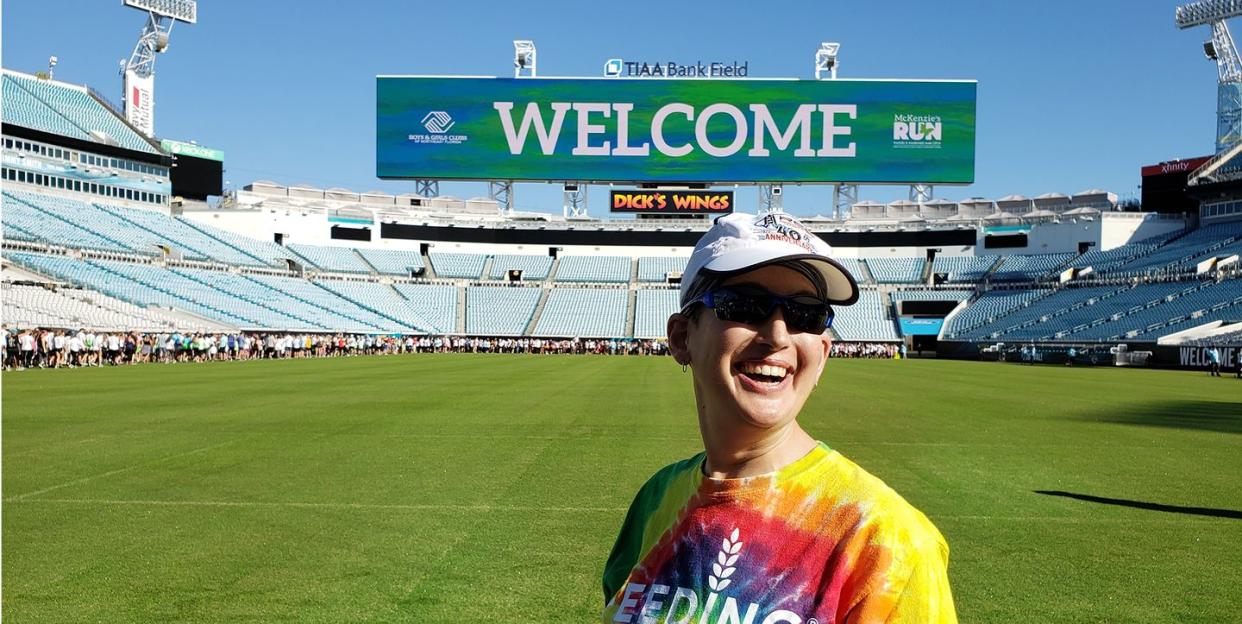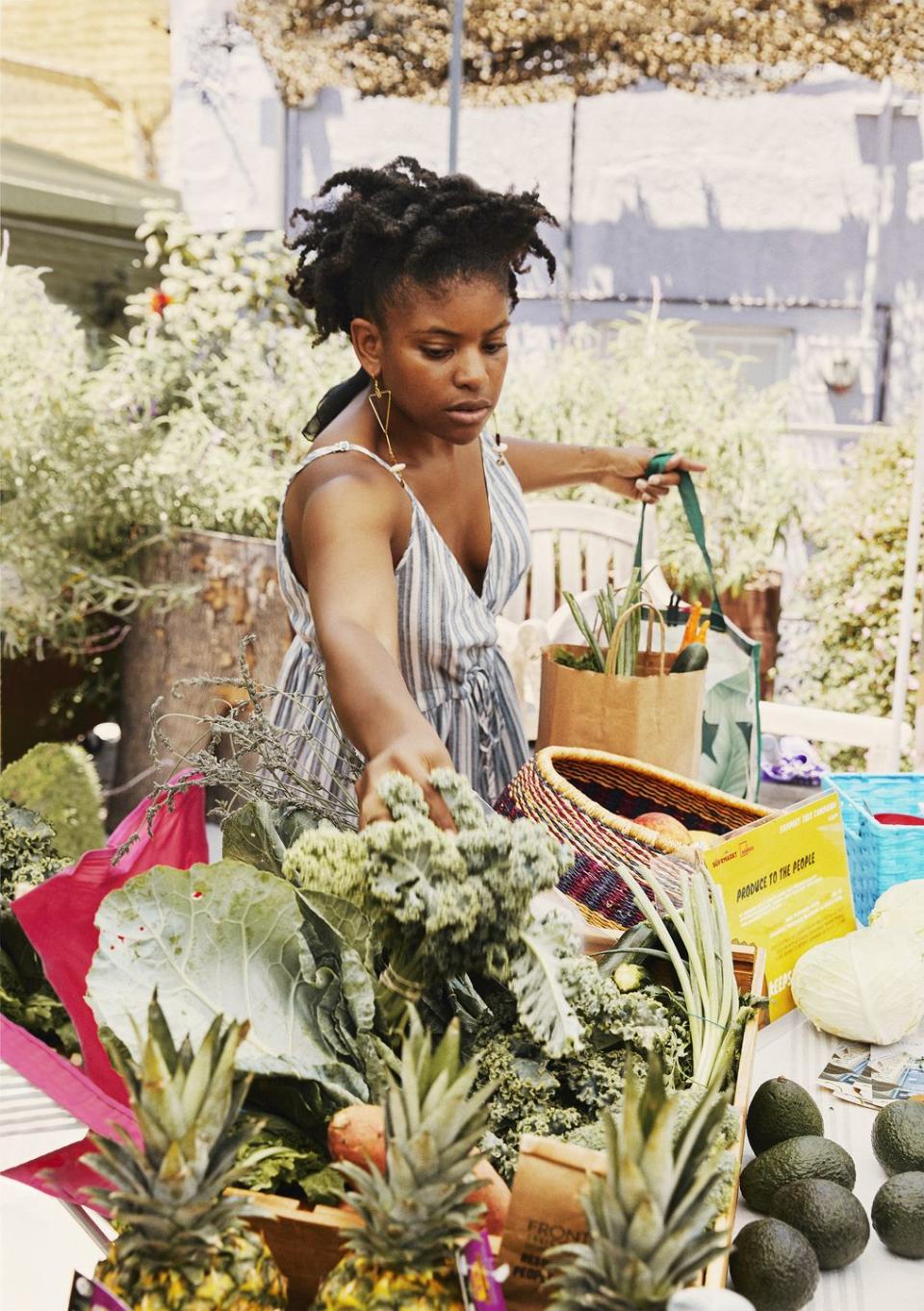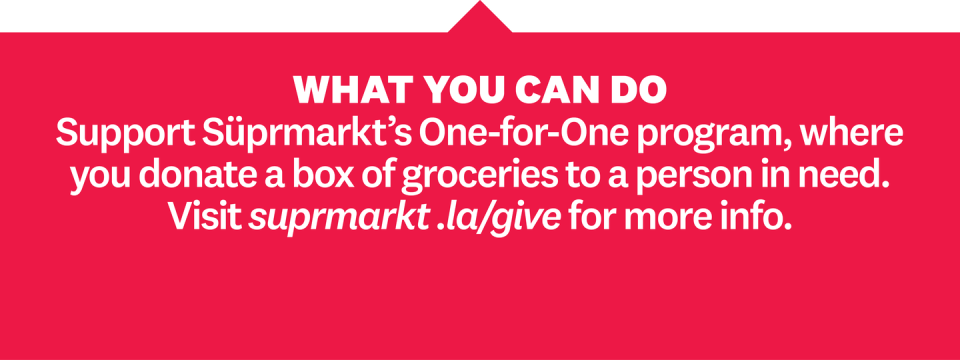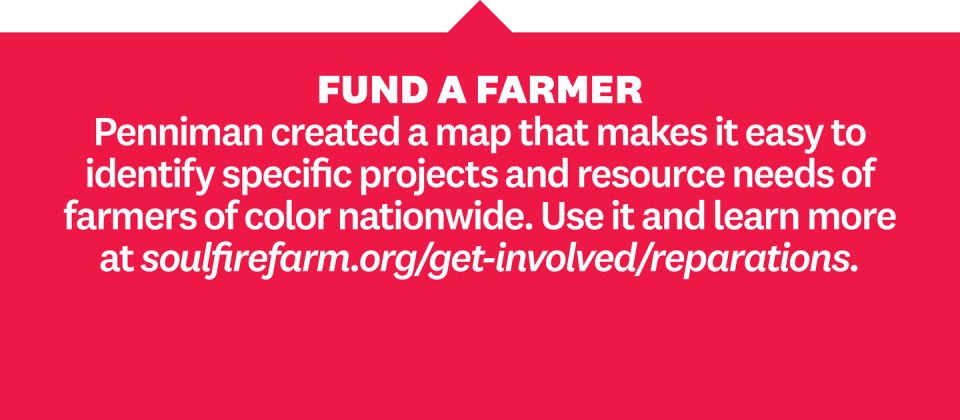This Woman Volunteered At 200 Food Banks And Ran 100 Marathons To Fight Hunger

When COVID-19 came to (all of our) town(s), lives were thrown into a tailspin, and for many, make-or-break questions bubbled up:How will I earn money? How will I pay my bills? How will I feed my family? The questions are basic, but their significance is obvious and the answers complex.
Food insecurity—the lack of consistent access to enough food to lead a normal, active life—has been an issue in the U.S. for decades. Roughly one in nine Americans (a staggering 37 million people!) were considered food insecure in 2018, according to the U.S. Department of Agriculture.
And the pandemic exposed the cracks in a precarious system: As unemployment rises, so, too, do food issues. Feeding America, a hunger-relief organization, estimates that for every percentage point increase in unemployment, 3.3 million more folks will become food insecure. The problem isn’t purely financial: Those with food insecurity are also more likely to be in poor health, which puts them at a higher risk of suffering ill effects if they do contract the virus. (Talk about a vicious cycle.) Couple that with social distancing and the initial panic-buying that put those who couldn’t buy in bulk at a disadvantage, and it isn’t hard to see why access to healthy food became insanely difficult. And that is still an understatement.
But there is hope—and we’re finding it in these women who are sparking change.
The Activist
Olympia Auset, Bringing Fresh Food Home

While living on the border of Los Angeles and Inglewood, California, Auset traveled up to two hours by bus to access healthy food from better grocery stores and community co-ops. “There was a fish shop, a liquor store, and fast-food options,” says Auset of her neighborhood. At 23, Auset saw people she cared about pass away from preventable diseases, including a friend’s mom who died of a stroke before the age of 50. She knew her community needed more access to affordable fresh fruits and vegetables if they were going to live longer lives—and she was determined to bring it to them.
Making Moves
In June 2016, Auset, along with a few friends, spent $100 to buy organic produce and set up a stand in South L.A.’s Leimert Park neighborhood, selling to neighbors who were eager to get this produce. This was the start of Süprmarkt—a low-cost organic market Auset founded. People can pre-order weekly produce baskets for a reduced fee as well. (She’s able to subsidize part of the cost for shoppers through the nonprofit arm of her organization.) They do it all with one fridge, stocked with fruits and vegetables sourced from organic wholesalers and local farmers, and a couple of tables, powered by a team of 20 volunteers.
Offering Options
Once the pandemic hit, Auset’s effort became even more critical. She sprang into action, procuring 1,400 pounds of grains and seeds for people in need and partnering with food providers to give free or discounted meals to those impacted by the crisis. And she encourages everyone to think, really think, about this issue. “Many people have never felt the frustration of wanting an avocado but knowing it’s going to be a whole mission to get it. You often have a choice, right? I’m going to eat healthy today or I’m not going to eat healthy today. So many don’t even have that option, and that’s what we’re trying to fix.”


The Marathon Runner
Jess Kurti, Advocating for Food Banks, Step-by-Step

In 2012, Kurti was downsized from her job at a utility company and wasn’t sure what to do next. She just knew she wanted to help others. She started volunteering at a local food bank in Kissimmee, Florida. At the time, she admits, she didn’t truly understand the extent of the hunger crisis. “I was clueless,” she says.
“I would see depressed neighborhoods, but I just assumed people were eating. It didn’t occur to me that this was a very serious issue.” What she learned, though, became her life’s calling. She started volunteering at her local food bank regularly, and whenever she took a trip, she’d find the nearest food bank and put in a few hours there too.
Sweating With Purpose
During this time, Kurti joined a running club. Inspired by her coach, Kurti set out to run 50 marathons—one in every state. But there was a twist: As she headed to each state to race, she also volunteered at all 200 Feeding America food banks nationwide. “I wanted to emphasize how little it takes to make a difference in your community as far as hunger is concerned,” she says. “If you’re close to a food bank, they need your help. Only a couple of hours a day can make a massive community impact.” In five years, Kurti (way!) overshot her goal, running 100 marathons and volunteering with each one.
Once her challenge was complete in 2019, Kurti began putting in more time at her local FA food bank in Florida and transitioned to full-time as the volunteer coordinator there.
Parting Words
“Food insecurity is a huge litmus test of how we’re doing as a country,” says Kurti. “It’s part of a larger systemic problem. Whatever cause you’re passionate about, I guarantee there’s a link to someone who’s food insecure. It’s all around us.” And Kurti says this became that much clearer during the pandemic. “There are so many people now slipping through the cracks, having to risk their health to go to work because if they don’t, they won’t be able to pay their bills or eat,” says Kurti. What she desperately wants you to know: You don’t have to run a ton of marathons to make waves. “Maybe you can’t go to a food bank right now, but you can have a food drive or donate money.”

The Farmer
Leah Penniman, Supporting Social Justice Through the Land

Penniman’s first summer job at 16 was on a farm outside of Boston. “I went to grade school in rural Massachusetts,” says Penniman. “My siblings and I were the only children of color in our school district, and in the face of a lot of bullying and exclusion, we made good friends with the forest and spent a lot of time in nature.” So when the moment came to find her first gig, Penniman says she naturally wanted to be outside, working with the land. “I fell in love with farming—there was an elegant simplicity to it.” Penniman went on to become a high school teacher, but her love for farming continued. When she moved with her family in 2005 to Albany, New York, she struggled to find fresh food for her children, now 15 and 17, in an area suffering from what Penniman calls “food apartheid,” as opposed to a food desert. “Desert implies a natural phenomenon,” she says. “There’s nothing natural about your zip code being a major predeterminant of your life expectancy. Apartheid is a human-created system of segregation. I think using that word empowers us because anything created by people can be changed.”
Ripple Effect
At first, Penniman’s goal was simply to farm the 80 acres of eroded land that she had purchased to feed her family. But quickly that evolved into Soul Fire Farm, a BIPOC-centered training farm, that, says Penniman, is “committed to ending racism in the food system.” Through their “doorstep delivery program,” the farm serves the community by giving food at low or no cost to locals who are impacted by “food apartheid.” They also teach agricultural practices in person and via online courses (right now).
Building, Building
A program called Soul Fire in the City builds gardens in low-income communities that might not otherwise have the resources to start and maintain them. Last year, Penniman’s team built three. This year, they’ve already built 50 (!) and are continuing to do so, since farmers are essential workers. And throughout the pandemic, their doorstep delivery food program fed about 100 families per week. Inspiring!

This article appears in the October 2020 issue of Women’s Health. Become a WH Stronger member now.
You Might Also Like


